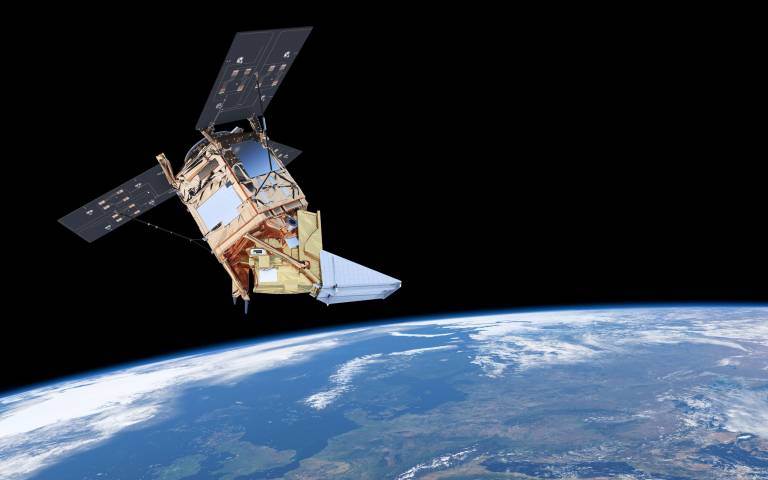Using space technology to fight bowel cancer
29 April 2019
UCL spin-out Odin Vision, which is using space technology to improve the early detection and diagnosis of bowel cancer, has secured £1 million funding from the UK Space Agency.

Bowel cancer is the second most common cause of cancer-related deaths in the UK and detecting it using traditional colonoscopy methods can be challenging for doctors. With a survival rate of 90% through early diagnosis, new ways of identifying and diagnosing cancerous growths sooner are vital.
The team of UCL engineers and clinicians behind the company are developing revolutionary AI system that identifies and characterises polyps by analysing live colonoscopy video, leading to early treatment and saved lives. It uses the same technology essential for reliably delivering data quickly between Earth and spacecraft up to millions of miles away.
The Early diAgnosis Real-Time Healthcare System for CANcer (EARTH SCAN) project will use secure, high-speed satellite communications with bespoke space compression software to create a cloud-based AI system that can support doctors in their decision making.
Through the use of space technology, the system can be deployed anywhere on earth enabling patients to receive a consistent, high level of care.
“We are moving into a new era of healthcare where Artificial Intelligence (AI) will support doctors to identify and diagnose cancer faster and more effectively,” said Peter Mountney, CEO of Odin Vision and Royal Society Entrepreneur in Residence at UCL Engineering.
“The EARTH SCAN project is an exciting opportunity to use satellite technology to bring this AI support to doctors in real-time. Real-time support means doctors can make immediate decisions regarding treatment and patients can receive the results of their scan straight away instead of waiting weeks.”
Professor Danail Stoyanov (UCL Computer Science and Wellcome / EPSRC Centre for Interventional and Surgical Sciences at UCL), added: “The EARTH SCAN project has incredible potential to impact bowel cancer patients across the globe. The use of satellite technology originally developed for space will connect clinics and hospitals anywhere to the cloud. This means that the AI system we have developed could be deployed as effectively in rural, low-resource communities as in leading specialist hospitals.”
The funding from UKSA marks the 70th birthday of the NHS and was announced today by Science Minister Chris Skidmore.
“It’s incredible that artificial intelligence technology that was first developed decades ago and is being used to examine distant planets, will now help detect some of the hardest to treat cancers at their earliest stages,” said Science Minister Chris Skidmore
“With bowel cancer the second most common cause of cancer-related deaths, this kind of innovation will be crucial in helping the NHS prevent more than 20,000 cancer-related deaths a year by 2033 – a key aim of our modern Industrial Strategy.”
Professor Laurence Lovat (UCL Surgery & Interventional Science, UCL WEISS and UCLH) said: "The AI system aims to support clinicians in the early detection and diagnosis of cancerous polyps. Earlier intervention has a vital impact on improved survival rates for bowel cancer patients and may save many lives.”
Odin Vision has also received investment from the UCL Technology Fund, London Co-Investment Fund, InnovateUK, the NHS and the European Space Agency. A clinical trial at UCLH is planned in the next year.
The project is a collaboration between Odin Vision, UCL and UCLH with support from Avanti Communications and SEHTA. Odin Vision is a UCL spin-out supported through UCLB’s Portico Ventures programme.
The fundamental research underpinning the AI system was developed there with the funding support of the European Commission Project.
Links
- Professor Danail Stoyanov's academic profile
- Professor Laurence Lovat's academic profile
- Wellcome / EPSRC Centre for Interventional and Surgical Sciences at UCL
- UCL Computer Science
- UCL Surgery & Interventional Science
- UCL Engineering
- UCL Medical Sciences
- UCLB
- UCL Tech Fund
- UCL Innovation & Enterprise
Image
Source
Media contact
Bex Caygill
Tel: +44 (0)20 3108 3846
Email: r.caygill [at] ucl.ac.uk
 Close
Close

